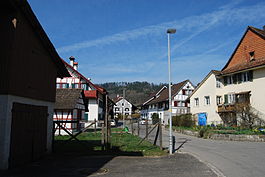Hüntwangen
| Hüntwangen | ||
|---|---|---|
 |
||
|
||
| Coordinates: 47°36′N 8°30′E / 47.600°N 8.500°ECoordinates: 47°36′N 8°30′E / 47.600°N 8.500°E | ||
| Country | Switzerland | |
| Canton | Zurich | |
| District | Bülach | |
| Area | ||
| • Total | 4.91 km2 (1.90 sq mi) | |
| Elevation | 390 m (1,280 ft) | |
| Population (Dec 2015) | ||
| • Total | 1,013 | |
| • Density | 210/km2 (530/sq mi) | |
| Postal code | 8194 | |
| SFOS number | 0061 | |
| Surrounded by | Eglisau, Glattfelden, Hohentengen am Hochrhein (DE-BW), Wasterkingen, Wil | |
| Website |
www SFSO statistics |
|
Hüntwangen is a municipality in the district of Bülach in the canton of Zürich in Switzerland.
Hüntwangen is first mentioned in 1254 as Hiuntwangin.
Hüntwangen has an area of 4.9 km2 (1.9 sq mi). Of this area, 50.9% is used for agricultural purposes, while 32.9% is forested. Of the rest of the land, 13.6% is settled (buildings or roads) and the remainder (2.6%) is non-productive (rivers, glaciers or mountains).
The municipality is located on the western edge of the Rafzerfeld, the region in the district which is north of the Rhine.
Hüntwangen has a population (as of 31 December 2015) of 1,013. As of 2007[update], 7.4% of the population was made up of foreign nationals. Over the last 10 years the population has grown at a rate of 22.9%. Most of the population (as of 2000[update]) speaks German (96.8%), with Italian being second most common ( 0.8%) and French being third ( 0.5%).
In the 2007 election the most popular party was the SVP which received 42.8% of the vote. The next three most popular parties were the SPS (17%), the FDP (11.2%) and the Green Party (8.9%).
The age distribution of the population (as of 2000[update]) is children and teenagers (0–19 years old) make up 24.3% of the population, while adults (20–64 years old) make up 63.2% and seniors (over 64 years old) make up 12.5%. In Hüntwangen about 85.5% of the population (between age 25-64) have completed either non-mandatory upper secondary education or additional higher education (either university or a Fachhochschule).
...
Wikipedia




